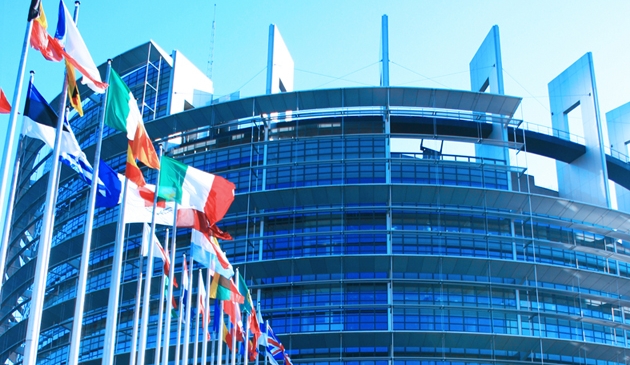
EU politics after the elections
by Hugo Brady
EU policies were not the issue that guided most voters in last week’s elections to the European Parliament. The economic crisis and job safety were uppermost in people’s minds. It is therefore surprising that in the EU’s six largest member-states, socialist parties – whether in government or opposition – either did poorly or were routed. It was the centre-right, liberal and green parties that triumphed, gaining the majority of the assembly’s 736 seats. The far-right picked up a few extra seats as did single-issue, eurosceptic parties.
How to explain the centre-left’s eclipse? To suggest a single, pan-European explanation would be a little dubious. Election campaigns were, almost without exception, based on local and national issues. Nevertheless, European electorates appear to trust conservative or liberal parties to get them out of the current crisis in better shape than the left. In countries like Italy or France, where socialist parties are not in power, the centre-left was too complacent that the crisis would mean an automatic increase in their share of the vote. Also, sterner language by centre-right parties on immigration issues over the last year probably served to shore up their votes in some countries.
For the next five years, the European Parliament will be dominated, but not controlled, by the European People’s Party (EPP, the group of centre-right parties), which won 264 seats. New MEPs are already haggling over which committee chairmanships each political group will get and who will be the parliament’s next president. More importantly, the EPP is attempting to cobble together the majority (369 votes) needed to approve current European Commission president, José Manuel Barroso, for a second term. EU governments are likely to approve Barroso’s reappointment at a summit in Brussels next week. If the EPP’s leader, Joseph Daul, can get the Liberals, the anti-federalist European Conservatives and some independents on board, Barroso, a liberal-leaning conservative, will be re-appointed. That will mean that future EU policies – in critical areas like the environment, financial regulation, migration and energy policy – should continue to be governed by the same centre-right consensus that has prevailed since 2004. However, France’s president, Nicolas Sarkozy, might support Barroso’s reappointment only on the understanding that a major economic portfolio such as trade, internal market or competition will go to a French nominee in the next Commission.
The election results have affected Europe’s political landscape in other ways, too. First, the parliament’s credibility is under threat from an ever-decreasing electoral turnout. At just over 43 per cent, average turnout was higher than expected (some polls predicted participation as low as 35 per cent). But the trend towards voter apathy that has been apparent since direct elections to the assembly began 30 years ago continues. This trend is in stark contrast to the European Parliament’s rising powers and relevance. Almost ten years ago, Oxford academic Larry Siedentop argued that an indirectly elected ‘European senate’ of national parliamentarians would be a better way to give voters a proper say over European integration, an idea revisited in The Economist this week. If turnout in the next two elections falls below 40 per cent, Siedentop’s idea should be dusted off.
Second, Libertas, the group that led the campaign against the Lisbon treaty in last year’s Irish referendum, fielded over 500 candidates in various EU countries. But it failed to make an impact in any, despite spending some €30 million. Declan Ganley, Libertas’ leader, failed to win a seat in Ireland. His retirement from politics makes a Yes vote in Ireland’s second treaty referendum, expected in early October, more likely. He was a key factor in swaying undecided, mildly pro-European voters whose support is critical if the treaty is to pass. However, the amount of media attention heaped on Ganley partially obscured the utter failure of pro-European parties to give voters strong arguments as to why the treaty matters. If this failure is repeated, other member-states can expect a second No, whatever Ireland’s economic circumstances or perceived reliance on the EU.
Third, the elections highlighted that popular anti-EU feeling in Britain is at an all-time high. Well over 50 per cent of the British vote went to eurosceptics of various hues. The Conservative party and UKIP, both staunch opponents of the Lisbon treaty and of further EU integration, gained seats, while the ruling Labour party received an historically low share of the vote. That suggests a future British government will face fresh calls for a referendum on Britain’s place in Europe, whether linked to the Lisbon treaty or not. Conservative leader David Cameron, if and when he becomes prime minister, will be haunted by Britain’s 20-year EU debate as much as his predecessors were. In the end, the Tories might be relaxed about fundamentally re-defining Britain’s relationship with France and Germany. But Britain’s ally, the US, wants it to remain a fully engaged EU member-state. The Obama administration will be dismayed if Britain chooses to relinquish or renegotiate its status.
Lastly, victories for the far-right, including the Dutch Freedom Party, British National Party, Hungarian Jobbik and Greater Romania Party, have caused anguish among Europe’s political mainstream. Although far-right parties gained no more than eight extra seats, they look likely to have enough seats to form a separate group in the next European Parliament. Under new rules, groups can be formed by a minimum of 25 MEPs from seven different countries. Being a member of such a group gives parties access to significant funds and the right to chair or steer committees. Whether such a far-right grouping would have a lot of political influence remains to be seen, however. In the 2004-2009 parliament, the far-right ‘Identity, Tradition, Sovereignty’ group quickly dissolved due to irreconcilable differences between the parties. The Parliament’s new cohort of extreme nationalists and anti-immigration parties may soon realise what those in the political mainstream have long known: working with foreigners can be tough.
Hugo Brady is a research fellow at the Centre for European Reform.
